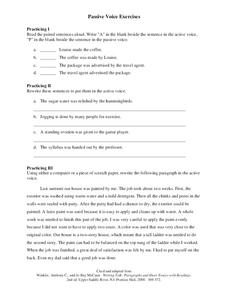K12 Reader
Nightmare Negatives: Correcting Double Negatives
Banish those very scary double negatives with some grammar practice. Learners rewrite eight sentences so that they no longer contain double negatives. The resource includes a sample sentence with correction as well as some information...
Curated OER
Figurative Language
Have your kids read twelve sentences and underline figurative language in each sentence. They will better grasp connotative and denotative language by rewriting the sentences with the same meaning omitting the figurative language.
Curated OER
Could Have, Should Have, Would Have
Could have, should have, would have learned your auxiliary verbs! Use this resource to describe the meaning of each set of words, and then let your kids try to complete the given sentences. Since most people don't actually take the time...
K12 Reader
Identifying Appositives
Young grammarians identify the appositives in a series of sentences and then rewrite each sentence omitting the word or phrase.
Curated OER
Passive Voice Exercises
Strengthen understanding of grammar and syntax with this task. First, grammarians identify the active and passive voices, then they rewrite individual sentences to be in the active voice before manipulating an entire paragraph. Great...
Curated OER
Consistent Point of View
Do your young grammarians have a hard time keeping their point of view consistent in writing? Use this resource to help them keep their point of view straight. After reading the reference sheet and instructions, learners rewrite eight...
Curated OER
Its or It's
What's the difference between its and it's? Clear up any misunderstandings in your third grade language arts class. Practice sentences use its or it's twice, prompting learners to use context clues for each usage. At the end of the...
Curated OER
Excessive Nominalizations
Eliminate unnecessary nominalizations from your middle schoolers' writing! After reviewing a reference page for the -tion ending (and when it can be excessive in writing), students rewrite eight sentences to change nominalizations to a...
K12 Reader
Adverbs of Frequency
How often do Peter and Sally go out dancing at night? How often do my cousin and I get in trouble at school? Help kids with adverbs of frequency with a straightforward grammar worksheet. They use the adverb in parentheses to rewrite the...
K12 Reader
Punctuating Appositives
Where do the commas go? Kids rewrite a series of sentences using commas to set off the appositives in each sentence.
Curated OER
Irregular Preterite worksheet
Have your beginning Spanish language learners practice conjugating with verbs that are irregular in the preterite form. Three exercises are provided here. The first requires language learners to rewrite a series of sentences in the...
Curated OER
Subject Verb Agreement- To Have
Which option fits best: has, had, or have? Your English language learners read the 20 sentences provided and select the correct word to complete each sentence. Then, after selecting the correct words, they rewrite each sentence on the...
Student Handouts
Apostrophe Catastrophe
Avoid punctuation errors that have you wondering whether a word is plural or possessive. Learners practice adding in apostrophes to contractions and possessive words by rewriting each sentence correctly.
Student Handouts
Capitalization Challenge
Ensure that your pupils have capitalization down by asking them to practice with these worksheets. Learners rewrite each sentence with correct capitalization. The original sentences do not start with capital letters and include proper...
Curated OER
Strong Verbs
Add interest to your class's writing by having them focus on strong verbs. Using this worksheet, first have them identify all of the main verbs in each sentence. Then, have them rewrite each sentence using a stronger verb. Practice often...
Curated OER
Malapropisms
What's the difference between an allegory and an alligator? Fifth graders work with malapropisms to determine the meanings of words that sound alike. Five sentences challenge them to find the malapropism and change it to the correct...
Curated OER
Possessive Apostrophes
Apostrophes are important when indicating ownership. Have third graders rewrite several sentences to include possessive apostrophes, both singular and plural. A great addition to a proofreading unit or a warm-up grammar activity.
K12 Reader
Apostrophe Practice
Knowing when and where to insert an apostrophe is important, as well as knowing the meaning of that apostrophe. Class members read sentences and practice putting apostrophes where they are needed.
Willow Tree
Percents
We see percents everywhere! Building a solid understanding of their meaning is important to future mathematics, but also as citizens. Young scholars practice rewriting decimals, percents, and fractions. They also determine percents of a...
Dorling Kindersley
Punctuation Practice
Need some punctuation practice? Challenge your third or fourth graders' editing skills with a helpful instructional activity on punctuation. After naming different types of punctuation marks, they rewrite a paragraph that has multiple...
Curated OER
Active Voice vs. Passive Voice
What is the passive voice? What is the active voice? Which voice is typically preferred in writing? Use this worksheet to discuss the different voices. Then, have learners rewrite a series of sentences so that they are in the passive...
Curated OER
Checking Grammar: Accuracy
Get young writers in the practice of editing their work using this punctuation and grammar worksheet. They first read eight sentences with grammar issues, rewriting or checking off as correct. The sentence errors involve subject-verb...
Curated OER
Punctuation: Quotation Marks, Question Marks, and Exclamation Marks
There are four children pictured, each is saying a different phrase. It's up to you and your first graders to complete each phrase by adding proper punctuation. Read the dialogue-driven passage, then read what each child is saying,...
K12 Reader
Add an Appositive 2
Do your kids need additional practice with appositives? A straightforward activity prompts them to rewrite a series of sentences, adding appositives to each one.























